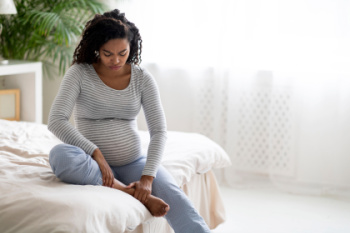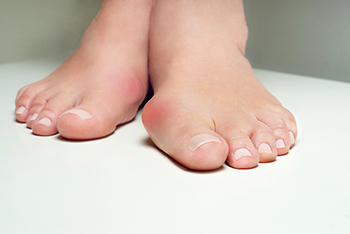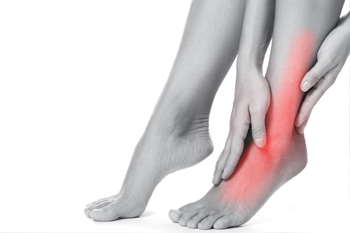April 2024
Understanding the Role of Custom Orthotics

Orthotics play an essential role in alleviating various foot and lower limb conditions. When prescribing orthotics, several factors are considered, including biomechanical alignment, patient aesthetics, compliance, and joint stability. Biomechanical assessments evaluate gait patterns, foot structure, and joint range of motion to determine the most effective orthotic design. Aesthetics consideration involves ensuring that orthotics fit comfortably into the patient's shoes and lifestyle. Patient compliance is vital for long-term success, as orthotics must be worn consistently to achieve desired outcomes. Custom-made orthotics are preferred for their tailored fit and targeted support. They address specific biomechanical issues, providing support, stability, and alignment correction as needed. These orthotics are crafted based on precise measurements and molds of the patient's feet, ensuring optimal functionality and comfort. If you would like to learn how custom-made orthotics can improve your mobility and quality of life, it is suggested that you schedule an appointment with a podiatrist for an evaluation and further discussion.
If you are having discomfort in your feet and would like to try orthotics, contact Dr. Robert Graser from Graser Podiatry and Bunion Surgery Institute. Our doctor can provide the care you need to keep you pain-free and on your feet.
What Are Orthotics?
Orthotics are inserts you can place into your shoes to help with a variety of foot problems such as flat feet or foot pain. Orthotics provide relief and comfort for minor foot and heel pain but can’t correct serious biomechanical problems in your feet.
Over-the-Counter Inserts
Orthotics come in a wide variety of over-the-counter inserts that are used to treat foot pain, heel pain, and minor problems. For example, arch supports can be inserted into your shoes to help correct overarched or flat feet, while gel insoles are often used because they provide comfort and relief from foot and heel pain by alleviating pressure.
Prescription Orthotics
If over-the-counter inserts don’t work for you or if you have a more severe foot concern, it is possible to have your podiatrist prescribe custom orthotics. These high-quality inserts are designed to treat problems such as abnormal motion, plantar fasciitis, and severe forms of heel pain. They can even be used to help patients suffering from diabetes by treating foot ulcers and painful calluses and are usually molded to your feet individually, which allows them to provide full support and comfort.
If you are experiencing minor to severe foot or heel pain, it’s recommended to speak with your podiatrist about the possibilities of using orthotics. A podiatrist can determine which type of orthotic is right for you and allow you to take the first steps towards being pain-free.
If you have any questions please contact our office located in Boerne, . We offer the newest diagnostic and treatment technologies for all your foot and ankle needs.
Common Areas of Foot Discomfort During Pregnancy

Pregnancy brings about a multitude of changes in a woman's body, including the feet. As the body undergoes hormonal shifts and weight gain, it is not uncommon for expectant mothers to experience foot pain and discomfort. One common area of foot pain during pregnancy is the arches, as the added weight can cause the arches to flatten, leading to strain and discomfort. Additionally, swelling of the feet and ankles, known as edema, is a prevalent issue, particularly in the later stages of pregnancy. This swelling can cause tightness and discomfort in various areas of the feet. Another common source of foot pain during pregnancy is the heels, as the increased weight and changes in posture can place extra pressure on the heel area, resulting in pain and tenderness. If you have foot pain during your pregnancy, it is suggested that you consult a podiatrist who can offer you relief tips during this transformative time.
Pregnant women with swollen feet can be treated with a variety of different methods that are readily available. For more information about other cures for swollen feet during pregnancy, consult with Dr. Robert Graser from Graser Podiatry and Bunion Surgery Institute. Our doctor will attend to all of your foot and ankle needs.
What Foot Problems Can Arise During Pregnancy?
One problem that can occur is overpronation, which occurs when the arch of the foot flattens and tends to roll inward. This can cause pain and discomfort in your heels while you’re walking or even just standing up, trying to support your baby.
Another problem is edema, or swelling in the extremities. This often affects the feet during pregnancy but tends to occur in the later stages.
How Can I Keep My Feet Healthy During Pregnancy?
- Wearing orthotics can provide extra support for the feet and help distribute weight evenly
- Minimize the amount of time spent walking barefoot
- Wear shoes with good arch support
- Wear shoes that allow for good circulation to the feet
- Elevate feet if you experience swelling
- Massage your feet
- Get regular, light exercise, such as walking, to promote blood circulation to the feet
If you have any questions please feel free to contact our office located in Boerne, . We offer the newest diagnostic and treatment technologies for all your foot and ankle needs.
Kids Foot Facts

Feet are fascinating parts of the body with many interesting facts that children can learn about. Humans have 26 bones in each foot, and these bones work together to provide support, balance, and mobility. The feet have over 100 muscles, tendons, and ligaments, allowing for intricate movements like walking, running, and jumping. Feet also contain thousands of sweat glands, helping to regulate body temperature and keep them cool. Additionally, the soles of the feet are covered in tough skin called calluses, which protect them from friction and pressure. Kids might be surprised to learn that the size and shape of their feet can change as they grow, which is why it is essential to wear properly fitting shoes. By understanding these fun foot facts, children can appreciate the incredible design and functionality of their feet while learning how to care for them to stay healthy and active. If your child has foot pain for any reason, it is suggested that you visit a podiatrist who can offer appropriate treatment options.
Making sure that your children maintain good foot health is very important as they grow. If you have any questions, contact Dr. Robert Graser of Graser Podiatry and Bunion Surgery Institute. Our doctor can provide the care you need to keep you pain-free and on your feet.
Keeping Children's Feet Healthy
Having healthy feet during childhood can help prevent medical problems later in life, namely in the back and legs. As children grow, their feet require different types of care. Here are some things to consider...
Although babies do not walk yet, it is still very important to take care of their feet.
Avoid putting tight shoes or socks on his or her feet.
Allow the baby to stretch and kick his or her feet to feel comfortable.
As a toddler, kids are now on the move and begin to develop differently. At this age, toddlers are getting a feel for walking, so don’t be alarmed if your toddler is unsteady or ‘walks funny’.
As your child gets older, it is important to teach them how to take care of their feet.
Show them proper hygiene to prevent infections such as fungus.
Be watchful for any pain or injury.
Have all injuries checked by a doctor as soon as possible.
Comfortable, protective shoes should always be worn, especially at play.
If you have any questions please feel free to contact our office located in Boerne, . We offer the newest diagnostic and treatment technologies for all your foot and ankle needs.
Identifying Signs of a Bunion

Bunions, a prevalent foot condition, present distinctive signs that warrant attention for timely intervention. Characterized by a bony bump at the base of the big toe, bunions often cause pain, swelling, and redness in the affected area. As the condition progresses, the big toe may gradually deviate toward the other toes, causing discomfort and difficulty finding comfortable footwear. Additionally, individuals with bunions may experience corns or calluses due to friction and pressure against the shoe. Bunions can impair mobility and lead to chronic foot problems if left untreated. Factors such as genetics, wearing ill-fitting shoes, and certain foot deformities contribute to the development of bunions. Moreover, conditions like arthritis may exacerbate bunion symptoms. Understanding the signs of a bunion is essential for maintaining foot health and enhancing overall quality of life. If you have developed a bunion, it is suggested that you consult a podiatrist who can offer you effective treatment options, which may include surgery for permanent removal.
If you are suffering from bunion pain, contact Dr. Robert Graser of Graser Podiatry and Bunion Surgery Institute. Our doctor can provide the care you need to keep you pain-free and on your feet.
What Is a Bunion?
Bunions are painful bony bumps that usually develop on the inside of the foot at the joint of the big toe. As the deformity increases over time, it may become painful to walk and wear shoes. Women are more likely to exacerbate existing bunions since they often wear tight, narrow shoes that shift their toes together. Bunion pain can be relieved by wearing wider shoes with enough room for the toes.
Causes
- Genetics – some people inherit feet that are more prone to bunion development
- Inflammatory Conditions - rheumatoid arthritis and polio may cause bunion development
Symptoms
- Redness and inflammation
- Pain and tenderness
- Callus or corns on the bump
- Restricted motion in the big toe
In order to diagnose your bunion, your podiatrist may ask about your medical history, symptoms, and general health. Your doctor might also order an x-ray to take a closer look at your feet. Nonsurgical treatment options include orthotics, padding, icing, changes in footwear, and medication. If nonsurgical treatments don’t alleviate your bunion pain, surgery may be necessary.
If you have any questions, please feel free to contact our office located in Boerne, . We offer the newest diagnostic and treatment technologies for all your foot care needs.
Common Foot Conditions

Foot pain affects people of all ages and lifestyles. Among those who suffer most are individuals who spend long hours standing or walking, such as healthcare professionals, retail workers, and athletes. Older people are also more prone to developing foot conditions. Common problems leading to foot pain include various foot and nail conditions like bunions, ingrown toenails, and fungal toenail infections. Additionally, bone and joint pain, such as plantar fasciitis and arthritis, contribute significantly to discomfort. Tingling and numbness may also occur due to nerve compression or conditions like peripheral neuropathy. These issues can impair mobility and quality of life if left untreated. Proper footwear, custom-made orthotics, stretching exercises, and maintaining a healthy weight play a part in preventing and managing foot pain. If you are suffering from foot pain, it is suggested that you schedule an appointment with a podiatrist to address underlying causes, obtain treatment, and prevent complications.
Foot Pain
Foot pain can be extremely painful and debilitating. If you have a foot pain, consult with Dr. Robert Graser from Graser Podiatry and Bunion Surgery Institute. Our doctor will assess your condition and provide you with quality foot and ankle treatment.
Causes
Foot pain is a very broad condition that could be caused by one or more ailments. The most common include:
- Bunions
- Hammertoes
- Plantar Fasciitis
- Bone Spurs
- Corns
- Tarsal Tunnel Syndrome
- Ingrown Toenails
- Arthritis (such as Gout, Rheumatoid, and Osteoarthritis)
- Flat Feet
- Injury (from stress fractures, broken toe, foot, ankle, Achilles tendon ruptures, and sprains)
- And more
Diagnosis
To figure out the cause of foot pain, podiatrists utilize several different methods. This can range from simple visual inspections and sensation tests to X-rays and MRI scans. Prior medical history, family medical history, and any recent physical traumatic events will all be taken into consideration for a proper diagnosis.
Treatment
Treatment depends upon the cause of the foot pain. Whether it is resting, staying off the foot, or having surgery; podiatrists have a number of treatment options available for foot pain.
If you have any questions, please feel free to contact our office located in Boerne, . We offer the newest diagnostic and treatment technologies for all your foot care needs.
Blog Archives
- July 2024
- June 2024
- May 2024
- April 2024
- March 2024
- February 2024
- January 2024
- December 2023
- November 2023
- October 2023
- September 2023
- August 2023
- July 2023
- June 2023
- May 2023
- April 2023
- March 2023
- February 2023
- January 2023
- December 2022
- November 2022
- October 2022
- September 2022
- August 2022
- July 2022
- June 2022
- May 2022
- April 2022
- March 2022
- February 2022
- January 2022
- December 2021
- November 2021
- October 2021
- September 2021
- August 2021
- July 2021
- June 2021
- May 2021
- April 2021
- March 2021
- February 2021
- January 2021
- December 2020
- November 2020
- October 2020
- September 2020
- August 2020
- July 2020
- June 2020
- May 2020
- April 2020
- March 2020
- February 2020
- January 2020
- December 2019
- November 2019
- October 2019
- September 2019
- August 2019
- July 2019
- June 2019
- May 2019
- April 2019
- March 2019
- February 2019
- January 2019
- December 2018
- November 2018
- October 2018
- September 2018
- August 2018
- July 2018
- June 2018
- May 2018









